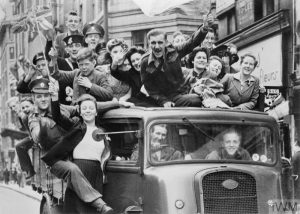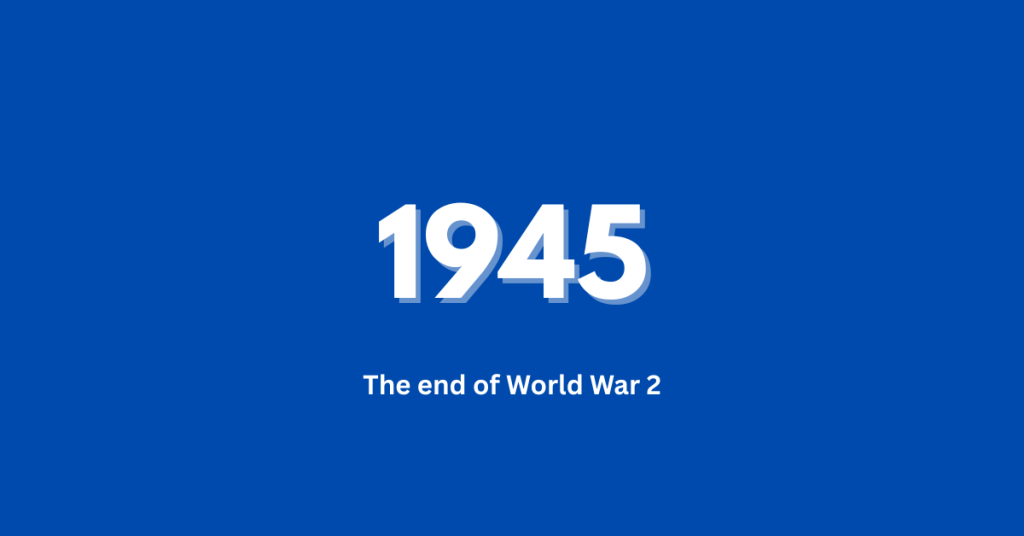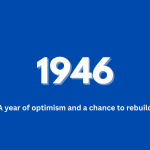What happened in 1945 changed the world forever. It marked the end of World War II, the most devastating conflict in human history. This pivotal year was filled with tragedy, relief, and the beginning of a new world order. As nations rebuilt, the first signs of the Baby Boomer generation emerged — and many institutions and technologies that would shape the modern world were born.
World Events
-
Jan 27 – Soviet troops liberate the Auschwitz and Birkenau concentration camps in Poland.
-
Feb 13 – Allied bombing of Dresden results in a firestorm that kills over 22,000 civilians.
-
Apr 29 – U.S. troops liberate the Dachau concentration camp in Germany.
-
Apr 30 – Adolf Hitler dies by suicide in his Berlin bunker.
-
May 2 – Over 1 million German soldiers surrender in Italy and Austria.
-
May 7 – Germany signs an unconditional surrender in Reims.
-
May 8 – Victory in Europe Day (V-E Day): The war in Europe officially ends.

VE DAY CELEBRATIONS IN LONDON, 8 MAY 1945 -
May 9 – The Soviet Union celebrates its own Victory Day.
-
Jun 4 – Germany is divided into four zones of occupation by the U.S., USSR, UK, and France.
-
Jul 17–Aug 2 – Potsdam Conference held to determine post-war Europe’s future.
-
Jul 26 – The Potsdam Declaration demands Japan’s unconditional surrender.
-
Aug 9 – A second atomic bomb is dropped on Nagasaki.
-
Aug 14–15 – Victory over Japan Day (V-J Day) is celebrated as Japan agrees to surrender.
-
Sep 2 – Japan signs formal surrender aboard USS Missouri, officially ending WWII.
-
Nov 20 – The Nuremberg Trials begin, prosecuting Nazi leaders for war crimes.
-
Jun 26 – The United Nations Charter is signed by 50 nations in San Francisco.
-
Aug 22 – Ho Chi Minh leads a successful coup in Vietnam, marking the beginning of the conflict.
-
Nov 16 – UNESCO (United Nations Educational, Scientific and Cultural Organization) is founded.
What happened in 1945 in the United Kingdom
-
VE Day (May 8) – Celebrations erupt across the UK as the war in Europe ends.
-
In July, Labour wins a landslide victory, and Clement Attlee becomes Prime Minister, replacing Winston Churchill.
-
In August, demobilisation begins; returning soldiers face a nation ready to rebuild.
-
The groundwork is laid for the modern welfare state, including key steps toward the National Health Service.
-
Meanwhile, food rationing and housing shortages persist, although public optimism begins to grow.
What happened in 1945 in the United States
- Apr 12 – Vice President Truman becomes president following Roosevelt’s sudden death.
-
Jul 28 – A U.S. bomber crashes into the Empire State Building, killing 14.
-
The Manhattan Project reaches completion, enabling the atomic bomb.
-
The G.I. Bill of Rights expands access to education and housing for returning servicemen.
-
American industry rapidly transitions from war production to peacetime consumer goods.
-
As a result, the U.S. emerges as a dominant global superpower.
-
Dec – Flight 19 vanishes over the Bermuda Triangle, sparking ongoing mystery.
Popular culture in 1945: Music, film, and recovery
-
Raymond L. Libby develops oral penicillin in the U.S., revolutionising modern medicine.
-
By war’s end, nearly 300,000 U.S. military personnel have died. Globally, total war deaths are estimated at over 55 million — with civilian casualties outnumbering military.
-
As nations mourn, they also begin the long process of recovery and rebuilding.
Film and Television – What people were watching in 1945
Despite wartime challenges, 1945 produced several lasting cinematic classics.
Notable Films Released:
-
Brief Encounter
-
The Lost Weekend
-
Spellbound
-
Dead of Night
-
Mildred Pierce
-
The Picture of Dorian Gray
-
The Wicked Lady
-
The True Glory
Television:
-
No TV broadcasts take place in the UK this year. Wartime fears of aiding German bombers meant broadcasting had been suspended. TV service resumes in 1946.
Music – What people listened to in 1945
Popular Songs and Artists:
-
“Don’t Fence Me In” – Bing Crosby & The Andrews Sisters
-
“Rum and Coca-Cola” – The Andrews Sisters
-
“Sentimental Journey” – Les Brown & Doris Day
-
“Till the End of Time” – Perry Como
-
“It’s Been a Long, Long Time” – Bing Crosby
-
“Lover Man” – Billie Holiday
-
“We’ll Gather Lilacs” – Muriel Barron & Olive Gilbert
-
“My Dreams Are Getting Better All the Time” – Doris Day
-
“Symphony” – Benny Goodman
-
“One for My Baby (and One More for the Road)” – Lena Horne
-
“Let the Rest of the World Go By” – Dorothy Squires
-
“Chickery Chick” – Sammy Kaye
Sports
-
Most international events are still suspended due to the war.
-
Wimbledon remains cancelled.
-
Domestic football resumes in parts of Europe.
-
In the U.S., baseball thrives again with the return of many players.
-
Meanwhile, the Army–Navy Game and college football continue to draw crowds.
What happened in 1945 in the motoring world
-
Car production resumes slowly across Europe and the United States.
-
The Volkswagen Beetle re-enters limited post-war production in Germany.
-
Austin and Morris factories restart operations in the UK.
-
Civilian car ownership remains restricted due to rationing.
-
Triumph is acquired by the Standard Motor Company, forming Triumph Motor Company (1945) Ltd.
-
The Ford Prefect 10 HP Model E93A enters production in October.
New Car Models Introduced:
-
Armstrong Siddeley Lancaster
-
Humber Hawk
-
Riley RMA
-
Standard Fourteen
Inventions and Breakthroughs in 1945
-
Atomic Bomb – The most controversial and powerful weapon ever created was first used in war.
-
Microwave Oven – Percy Spencer discovers microwave cooking while working with radar.
-
Ballpoint Pen – Mass production begins in the U.S. after earlier versions failed to take off.
-
Mainframe Computers – The groundwork for future computing (e.g., ENIAC) is laid.
-
Fluoride in Water – Grand Rapids, Michigan becomes the first U.S. city to fluoridate its water supply.
Looking back at what happened in 1945
The world breathed a collective sigh of relief as World War II ended. The destruction was immense, but hope began to return. The horrors of the Holocaust were fully revealed, while nations pledged to prevent future global conflict with the founding of the United Nations.
Whatever your memory, this year marked a return to a more normal life for many.
→ Feel free to share your memories or thoughts in the comments below!


